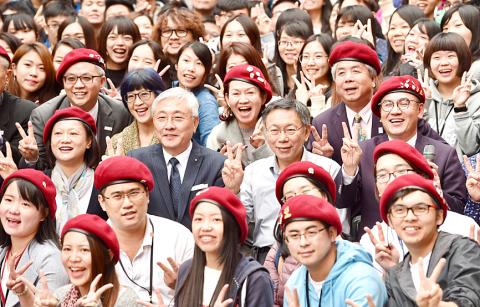Taipei Mayor Ko Wen-je (柯文哲) yesterday said the widening gap between the rich and poor must be solved through taxation and social welfare, but annual local government subsidies to elderly residents to mark the Double Ninth Festival is not the solution.
Ko made the remark after he was questioned by reporters following his speech to a Rotary International youth leadership camp in Taipei yesterday afternoon, when he was asked about a comment he made in September comparing local governments’ cash subsidies to elderly people to buying votes.
Citing French economist Thomas Piketty’s book Capital in the Twenty-First Century, Ko said earning money with money is faster than earning money with labor, and that is why the gap between rich and poor is widening.

Photo: Peter Lo, Taipei Times
The government can solve the problem in two ways: imposing progressive taxes on the rich or establishing a social welfare system that takes care of minority groups and elderly people, the mayor said.
“Normally, NT$1,500 is given to each elderly person, regardless of individual requirements and situations. However, when money is spent, government policy should have a guiding effect. For example, the government could issue seniors with transit cards providing NT$480 per month for public transportation fares to encourage people to get out and participate in activities,” he said.
“Taipei is the only one [local government] not to give out cash subsidies, but other cities and counties giving out cash does not mean that it is the right thing to do,” he said.
Money should be spent in a way that achieves the greatest benefits, he said.
Subsidies for children are given out after reviewing household income and household registry locations, which means equal amounts are not given to everyone, the mayor said.
Cash for elderly people should not be handed out in equal amounts for everyone, he said, adding that improving the long-term care system is more important than handing out money.
Rotary International is scheduled to hold its 2021 annual convention in Taipei, with more than 40,000 people from more than 100 nations expected to visit for the meeting.
Rotary members asked Ko what type of city he would like to present to visitors if he is re-elected next year.
“With [so many] foreign visitors coming to Taipei, of course we want to make a fortune by having them max out their credit cards,” Ko joked.
The city has three years to prepare for the event and it will establish an ad hoc group to handle those preparations, he said.

NATIONAL SECURITY THREAT: An official said that Guan Guan’s comments had gone beyond the threshold of free speech, as she advocated for the destruction of the ROC China-born media influencer Guan Guan’s (關關) residency permit has been revoked for repeatedly posting pro-China content that threatens national security, the National Immigration Agency said yesterday. Guan Guan has said many controversial things in her videos posted to Douyin (抖音), including “the red flag will soon be painted all over Taiwan” and “Taiwan is an inseparable part of China,” while expressing hope for expedited “reunification.” The agency received multiple reports alleging that Guan Guan had advocated for armed reunification last year. After investigating, the agency last month issued a notice requiring her to appear and account for her actions. Guan Guan appeared as required,

A strong cold air mass is expected to arrive tonight, bringing a change in weather and a drop in temperature, the Central Weather Administration (CWA) said. The coldest time would be early on Thursday morning, with temperatures in some areas dipping as low as 8°C, it said. Daytime highs yesterday were 22°C to 24°C in northern and eastern Taiwan, and about 25°C to 28°C in the central and southern regions, it said. However, nighttime lows would dip to about 15°C to 16°C in central and northern Taiwan as well as the northeast, and 17°C to 19°C elsewhere, it said. Tropical Storm Nokaen, currently

PAPERS, PLEASE: The gang exploited the high value of the passports, selling them at inflated prices to Chinese buyers, who would treat them as ‘invisibility cloaks’ The Yilan District Court has handed four members of a syndicate prison terms ranging from one year and two months to two years and two months for their involvement in a scheme to purchase Taiwanese passports and resell them abroad at a massive markup. A Chinese human smuggling syndicate purchased Taiwanese passports through local criminal networks, exploiting the passports’ visa-free travel privileges to turn a profit of more than 20 times the original price, the court said. Such criminal organizations enable people to impersonate Taiwanese when entering and exiting Taiwan and other countries, undermining social order and the credibility of the nation’s

‘SALAMI-SLICING’: Beijing’s ‘gray zone’ tactics around the Pratas Islands have been slowly intensifying, with the PLA testing Taiwan’s responses and limits, an expert said The Ministry of National Defense yesterday condemned an intrusion by a Chinese drone into the airspace of the Pratas Islands (Dongsha Islands, 東沙群島) as a serious disruption of regional peace. The ministry said it detected the Chinese surveillance and reconnaissance drone entering the southwestern parts of Taiwan’s air defense identification zone early yesterday, and it approached the Pratas Islands at 5:41am. The ministry said it immediately notified the garrison stationed in the area to enhance aerial surveillance and alert levels, and the drone was detected in the islands’ territorial airspace at 5:44am, maintaining an altitude outside the effective range of air-defense weaponry. Following